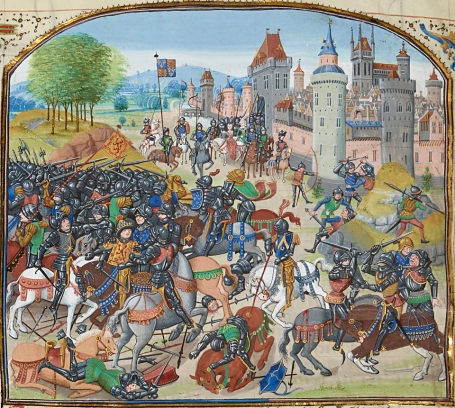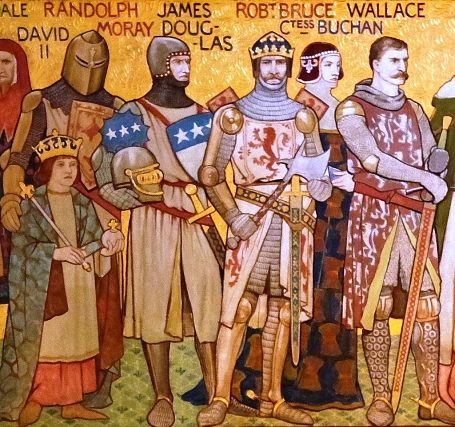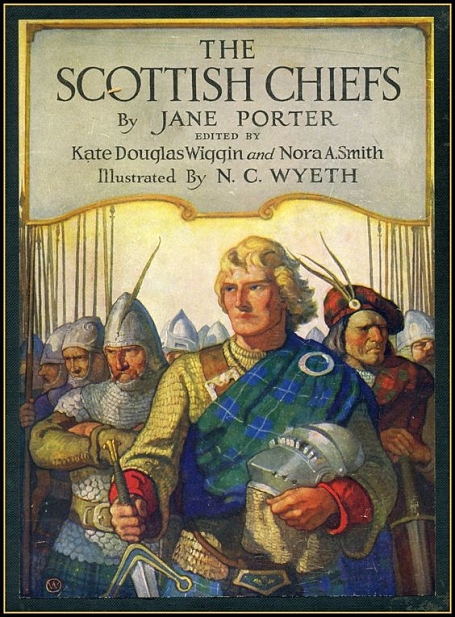The Life and Heroick Actions of the Renoun'd Sir William Wallace,
General and Governour of Scotland
by William Hamilton of Gilbertfield
Book XII, Chapter I (Continued)
How WALLACE conquer'd the Land of Guyen and was made Lord thereof.
Closs by, Nine Frenchmen were a mowing Hay,
Who do advance with all the speed they may.
Each, a sharp Syth into his rustick Hand,
As if forsooth, none might their Force withstand.
Nor was there any that could do it then,
Save only Wallace, that brave Prince of Men,
Who as soon as he could the Rogues descry,
Did leave his Men and then immediatly,
Most boldly did towards the Clowns advance,
Mock'd such Machines and all the Syths in France.
The first he met, ill may the Carle Thrive,
At Wallace with his Weapon made a Drive.
Had it a hit him as it miss'd, I vow,
No doubt it would have cut his Body through.
But Wallace being hearty, brisk and blyth,
Most cliverly he overleap'd the Syth.
Then with his Sword gave such a backward Blow,
As kill'd the Fellow, a brave Rary-show,
As in that Country e'er before was seen,
To see his Head hap-happing on the Green.
The next Clown's Syth he also jumped o'er,
And clove his Shoulder half a Yard and more.
Unto the Third most nimbly play'd the same,
Then at the Fellow such a Stroak did frame,
As gave him a prodigious Mortall Wound,
Till he gasp'd out his Last upon the Ground.
The Fourth he clove him cleanly thro' the Coast –
Let him take that, for all his Brag and Boast.
The Three first Syths, Wallace did overleap,
And by good Providence did thus escape.
Four Men he kill'd, one still at every Stroak,
Upon my Word it was a pretty Joke.
He that was last, was the first Man that fled,
Else he had got the cold Ground for his Bed.
Good Wallace then the Fifth does closs pursue,
O'ertakes him quickly, and the Fellow slew.
Then marched back to his own Men again,
Who Fourty-Nine had of the Frenchmen slain.
Seven did escape, and fled with all their Might,
A marvellous, but true and bloody Fight.
Four of the mowers did no more incline,
To stay, but scour'd and left their scythes behind.
Or else of them there had been news belyve,
Such as perhaps befel the other five.
Thus was the Knight and's Men caught in the Net,
Which basely they had for brave Wallace set.
For most of all were kill'd, the Rest they fled,
At which the King he was exceeding glad.
For Wallace sent, and pray'd him earnestly,
That he might one of his own Houshold be,
Where he might live in Peace, and rest secure,
Under the Covert of his royal Bow'r.
For well he knew that some envious were,
At Favours, which the King bestow'd him there.
No Wonder, for he rescu'd in few Days,
All Guyen Land to his immortal Praise.
In spite of all the South'ron's Force, and Pow'r,
Syn made them scamper off themselves, and scour.
And when he fairly did it thus reduce,
Did chase the South'ron all to Burdeous.
Then Two full Years remain'd at the French Court,
And was diverted with all princely Sport;
King, Lords and Ladies, much of him did make,
Both for his own, and ancient Scotland's Sake.
'Cause 'twixt the Kingdoms, there had been so long
A kind Alliance and a very strong.
The ballad, The Life and Heroick Actions of the Renoun'd Sir William Wallace, General and Governour of Scotland, by William Hamilton of Gilbertfield, 1722, is in the public domain.

The Kingdom of England and the Kingdom of Scotland fought dozens of battles with each other. They fought typically over land, particularly Berwick-Upon-Tweed, and the Anglo-Scottish border frequently changed as a result. Read more at Wikipedia.

The First War of Scottish Independence was the initial chapter of engagements in a series of warring periods between English and Scottish forces lasting from the invasion by England in 1296 ... Read more at Wikipedia.

Digitized version of The Scottish Chiefs, by Jane Porter, a novelization published in 1921 by Charles Scribner's Sons, about William Wallace and the First Scottish War of Independence. Read online at archive.org.